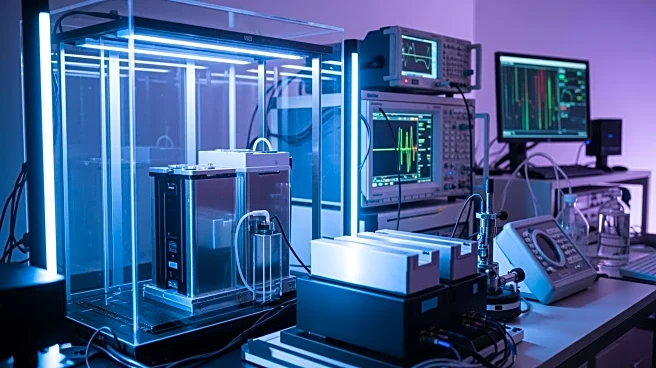What's Happening?
The National Renewable Energy Laboratory (NREL) is spearheading research into next-generation battery technologies, focusing on safety and performance improvements. As demand for lithium-ion batteries
continues to rise, NREL is exploring advanced designs such as alkali metal anodes and solid electrolytes. These innovations aim to enhance energy storage solutions while addressing safety concerns. NREL researchers, including Donal Finegan, are investigating the unique behaviors and risks associated with these new materials, emphasizing the importance of understanding kinetics, toxicity, and mechanical robustness. Their work includes developing strategies for fire suppression and evaluating battery safety at various levels, from electrodes to full battery packs. This research is crucial for refining cell designs and standardizing practices to ensure safe handling of battery hazards.
Why It's Important?
The advancement of safer battery technologies is critical for strengthening America's energy infrastructure. Safer batteries can increase energy availability for consumer electronics and national security systems, making them vital for various sectors. NREL's research is pivotal in overcoming challenges related to rapid gas release, toxic byproducts, and extreme thermal reactions in new battery designs. By employing advanced machine learning and multiscale modeling, NREL is accelerating the development and adoption of these technologies. This research not only supports the transition to more resilient energy systems but also enhances the safety protocols for first responders dealing with battery hazards. The insights gained from NREL's work are essential for guiding the future of energy storage solutions.
What's Next?
NREL plans to continue its rigorous evaluation of battery designs, focusing on characterizing cells and materials under various conditions. The laboratory aims to bridge the gap between material-level safety data and the behavior of large commercial batteries. Artificial intelligence will play a central role in predicting battery behavior under different conditions, facilitating the safe deployment of new technologies. As research progresses, NREL's collaboration with industry innovators will be crucial in bringing these advanced battery systems to market. The ongoing efforts are expected to lead to breakthroughs in grid-scale storage applications, further enhancing the reliability and safety of energy systems.
Beyond the Headlines
The implications of NREL's research extend beyond immediate safety concerns. The development of next-generation batteries could lead to significant shifts in energy policy and infrastructure, promoting sustainability and reducing reliance on traditional energy sources. The focus on Earth-abundant materials and solid electrolytes aligns with broader environmental goals, potentially reducing the ecological footprint of battery production. Additionally, the integration of artificial intelligence in battery research highlights the growing intersection of technology and energy solutions, paving the way for smarter, more efficient energy systems.









